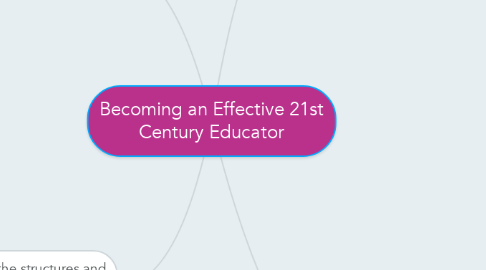
1. Being Informed of the structures and institutions that govern education in Alberta
1.1. Guest Lecture: Frank Peters (Sep. 2014)
1.1.1. Our country's educational history has a remarkable effect on our school systems today. As effective educators we must reflect on our past and constantly look to improve what can be improved, and preserve what has benefitted in the past.
1.2. Lecture: Canadian/Alberta Schools Structure and Legislation (Oct. 2014)
1.2.1. There are many factors that come together and keep the school systems in our country/provinces functioning as well as they do. The decisions of our officials in office have a direct impact on us as teachers, and by continuation, on the quality of education available to our students. This lecture helped clarify many of the inner workings of the educational system, and I think it is important that as teachers and (more importantly) as voters, we know how the system is operated.
2. Being aware of current issues in education
2.1. Guest Lecture: Michael Phair on Sexual and Gender Minority Students: GLBTQ Issues (Nov. 2014)
2.1.1. We cannot expect to become effective educators, not only until we are well aware of the issues that our students face in our schools, but until we are able to do something about these issues. In order to create a safe and nurturing environment for our students, we must convey our dedication to resolving issues such as homophobic bullying, etc..
2.2. Reading: Structural and Social Inequalities in Schooling (Nov. 2014)
2.2.1. Author Karen Robson discusses the different issues that students face today in schools. Including issues such as gender inequality, different socioeconomic status of families, and even how different locations/settings (such as neighbourhoods) can have varying effects on a student's learning. As educators it is our responsibility to assure every student has an equal opportunity to succeed. This means that we must first acknowledge these issues, and continuously seek for a solution.
3. Bringing about change requires our attention on current issues
4. Developing a professional identity
4.1. Lecture/Reading: Philosophy of Education (Sep. 2014)
4.1.1. Through this lecture/discussion we were able to discover which of the five educational philosophies most resonated with us. I found that I am more of a progressive teacher, and more of a guide rather than a taskmaster.
4.2. Lecture: How to Engage Constructively in Courses That Take a Critical Social Justice Approach (Sep. 2014)
4.2.1. Video: TED Ramsey Musallam
4.2.1.1. The three rules that Musallam discusses helped me further understand my future role as a teacher. I think that as pre-service teachers we have certain expectations as to how structured our classrooms will be. However, Musallam brings to light the truth of the "mess", and he also helps us accept it.
4.2.2. A teacher in the 21st century must aim for intellectual humility. With increasing diversity in our classrooms, it will be required of us to focus on understanding rather than agreeing with a topic/concept.
4.3. Reading: The Importance of Pedagogy (Sep. 2014)
4.3.1. The method of teaching is just as (if not more) important as what is being taught. I believe our students also learn from how we teach, and it can have a lasting effect on them. In order to become effective 21st century teachers, we must adjust our methods for every classroom and every subject so that our students benefit as much as possible.
5. Ways in which you can serve as an agent of change in schools/education
5.1. Lecture: Social Justice (Nov. 2014) Article: Why are Schools Brainwashing our Children?
5.1.1. In growing classrooms of today, there are many students of diverse backgrounds. A great way to help these students develop empathy for each other is through social justice programs, because often times, students are not exposed to controversial issues in other settings (eg. their homes).
5.1.2. There are many pressing issues that arise from some of these social justice programs. Discretion is important when discussing controversial issues, and we must consider the appropriateness of the topics for the age of the students, as well as their beliefs/backgrounds.
5.2. Lecture/Reading: On Becoming a Reflective Teacher (Sep. 2014)
5.2.1. I believe that keeping an open mind, as a teacher, is essential in bringing about a new culture of change in our schools. Students learn from not only what we teach them, but also what we model for them in our classrooms (hidden curriculum); and if we model an attitude of acceptance, so will our students.
